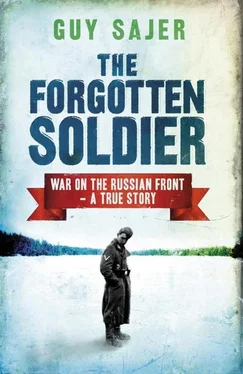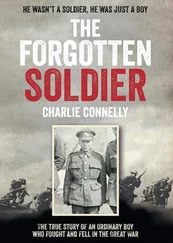Our diminished group had been sent to the northern edge of the stronghold, to a beach beside the sea, overhung by moderately high cliffs. We still held the clifftops, in bunkers which had been built facing the sea. However, the Russians had also reached the clifftops at several points, and even though they were not yet there in strength, they had sent out sharpshooters, who controlled the rocky beach along which we were crawling under their fire.
The German positions on these heights were fortified islands, surrounded by the enemy, and living on God knows what. There was no longer any question of the Gross Deutschland Division, or any other division. Everything which could still move in Memel was alive, and anything alive had to be used.
A ragged officer had brought us to this point, where he feared the Russians might break through our rear lines. Although the position was very dangerous, it was at least somewhat less dangerous than the official front. Tanks couldn’t get through unless they reached the heights, which we still dominated and weakly defended. For shelter, we used the holes dug by civilian refugees who had waited here for deliverance by sea.
We were in almost constant contact with the Russians. Ivan moved along the length of the coast, peppering us from the cliffs. Sometimes he used mortars. The sandy soil was as churned up as if a harrow had been through it, and we were constantly digging out both the living and the dead. However, in this soft soil, the impact of missiles was usually dissipated. The Russians were just playing with us, but they gave us no respite. If our heads hadn’t been empty, they would have burst with exasperation.
Although the cold was cruel, nature had also sent us fog, which was an ally. The Russians had infiltrated our lines, and were sometimes even killed from behind. They were afraid too and were hoping that support from their artillery and tanks would crush once and for all this cemetery where even the dead seemed to defy them. They infiltrated with great caution, and when they thought we could hear them, they shouted insults at us, telling us what they would do to our wives and mothers. They also said they were planning to remove parts of ourselves. Sometimes, too, they sang.
Hals and I listened, with our fingers on our triggers, because they often sang and shouted like that to distract us.
“Ai mayi drougii Germanski, kak sabatchi ch’olet! Ya tibai scajou spaciba ouyoudna mamenchka!”
Then they would count. “Listen, German soldiers. You are going to die. Listen: raz, dva, tri…”
Then they would let off a volley, while we listened in silence, like antennae destined to pick up all the ignominies on earth.
During the night, two more boats came. At the risk of instant death, a crowd of ragged soldiers ran to board them. We were too far from the shore to get there in time. As the nausea rose in our throats, we stood powerless, trying to calculate our isolation. Every time a boatload withdrew, our defense was weakened to that degree. Nothing could stop Ivan now. As soon as the wave broke, we would run like rats. The long nightmare turned heavily in our minds, and we all trembled uncontrollably.
Hals had lifted his gun to his head. I must have stared at him with enough sorrow to stop him. He turned back onto his stomach, and crushed his face into the ground.
The next day, we were still covered with fog. The front was quiet. Were the Russians preparing something?
Hals and Schlesser had crawled toward the water, toward a smashed car which stood in the spray at the edge of the beach. I joined them, taking maximum precautions. Hals spoke in a half whisper.
“You help us, Sajer. We’ll get those inner tubes. Three of them are still good.”
“To make floats?”
“Yes. A raft. But be careful. We don’t have any tools, so we’ll have to use bayonets. Do it like this — but be careful!”
I felt as if a shaft of light had pierced my mind. A raft. We might float for a long time, but this also might be our last chance. We had no tools, and we would have to get the tires off the wheels without lifting them. Trembling with anxiety, we set about this desperate task. The inner tubes had to be full of air, otherwise they’d be no good to us. Pferham came over and joined us.
“You’re crazy,” he said. “Even if you get the tubes out, they’re sure to burst. After all, it’s the tire that holds the pressure in.”
It was true that we’d been half off our heads for quite a while now. We couldn’t give up the idea of escape, and received Pferham’s objectivity with ferocious scowls.
“Then let’s take the whole wheel,” Hals said. “I’m sure they won’t float,” said Pferham.
“Shut up!” roared Hals. “You stick to your God. Myself, I have more confidence in these tires.”
Pferham said nothing more, and like the rest of us tried to free the nuts with the tip of his bayonet.
It took us at least two hours to complete the job. We also had to dig away the sand from under the right front tire, as the wreck was lying on its side.
We could hear the sound of heavy mortars in Memel. The ground shook as far out as we were, and it seemed likely that the Russians had taken a big slice of what was left of the town. We no longer dared to think about what might be happening there, concentrating instead on the ridiculous work we had undertaken. Twice we were forced to give it up, and get back to our holes. The Russians were infiltrating all along our positions, crawling through the fog almost everywhere. Hals and I clung to each other in our refuge. For the seventh or eighth time, we had fired almost point blank on Asiatic-looking men, with Asiatic faces. Each time, our Volkssturm shook in our hands, and we trembled with fright.
By evening, the whole city looked like a volcano. Stalin’s organs were howling without stopping, loosing a storm of random fire. Our shattered nerves no longer reacted. Everything was at once hazy and luminous. By now there were seven or eight of us fastening belts and boards onto the three tires which would probably never float; seven or eight who would probably be killing each other within minutes, for it was clear that the raft would never hold all of us.
It was ready. Schlesser and Pferham pushed it toward the water. We followed, like wolves afraid of missing part of the feast.
“Wait a minute, I’ll give it a try,” said Pferham.
We all took a step forward. Pferham looked at us. He knew that if he went too far we would kill him. Our silhouettes wavered against the lights which were consuming Memel, and our eyes followed the movement of the raft as it pitched, half-submerged on the dark water which melted into the night and fog.
As Pferham tried to maintain a balance which every physical law made impossible, he must have prayed to the sadistic God who watched him sink. He didn’t jump until the water had risen over his belt, as our safety foundered before our eyes.
The night passed slowly, lit by the huge fires. The beach, from which we stared with enormous eyes, shifted from pink to orange. A very young boy from one of the Volkssturm groups had succumbed to despair. His body remained wedged upright in the midst of our group, most of whom didn’t even notice that he had died. Another suddenly stood up and walked off, as if hypnotized by the flames in the south. moving toward Memel in a state which was certainly not conscious. We watched him disappear into the brilliant, unreal half darkness.
The Russians could have taken us by surprise now, without any attempt on our part to intercept them. The horrified faces of the last soldiers in the armies of the East were fixed with fascination on the apocalypse of Memel. At daybreak, the fire over the ruins of the town had turned pale yellow, almost white. We were given no orders or coordinates, and remained where we were, motionless and almost senseless, lost in the hideous solitude.
Читать дальше












